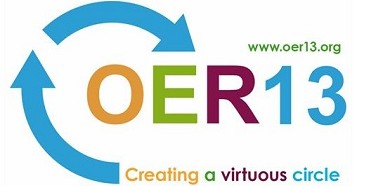I should probably start with a disclaimer: I am a strong supporter of open practices, but I am not an activist. My reflections on Doug’s entertaining keynote should therefore be interpreted in that light.
Doug’s keynote at OER13 began with a discussion on types of ambiguity and trajectories. It’s not entirely clear why the audience would be keen to be exposed to this discussion, but it appears that the bottom line was that it is not possible to define “open” in a way that satisfies everybody and that OER belongs in the “creative ambiguity” area.
The focus then shifted to Open Badges (OB), including the rationale behind the Mozilla Foundation’s support of OB. We were taken through the ‘anatomy of a badge’. Not surprisingly, metadata was referred to several times. A badge, Doug argued, constitutes evidence, trusted credentials, somehow captured explicitly in the metadata associated with the badge. Badges, he said, prove things outside of your community: they are a form of recognition and a way of representing yourself and your facets. There’s more to one’s transcript than silo-based qualifications. Badges are explicit by nature and provide a means of ‘jailbreaking formal education systems’. They encourage learner sovereignty and allow non-traditional pathways, Doug argued.
The next part of the keynote focused on web literacy standards. The Mozilla Foundation aims to create a web-literate planet, a generation of ‘web makers’. For this purpose, Doug and others have been working towards a web literacy learning standard, built with the community: an open learning standard for web literacy. People should be able to ‘earn badges around the web’. The OB approach, in the presenter’s view, should be seen as a platform for innovation.
The concluding part of the presentation was about ‘changing the world for the better’. OER and associated OEP are on the cusp of shifting from creative to productive ambiguity. The ‘Learning Registry’ could be a platform for innovation.
I confess that I left the session with as many doubts about OB as I went in with, but perhaps with more concerns. Some of the audience’s questions at the end illustrated similar concerns, and elicited some worrying statements, such as ‘you can award a badge for anything’ and ‘awarding an OB for trying’. In this context, the usual questions about these approaches became evident once more: would you hire someone whose “evidence of achievement” is presented to you in the form of open badges? Does packing a badge with metadata mean that everyone can see (and rely on) what and who is behind it? Does a badge give evidence of any form of achievement or, more importantly, competence?
An example was given of a group of people who apparently ‘provide trusted credentials for the small things they do’. Really?
Explicitness, trust, openness, opportunity, innovation and value are key works associated with OB. Those words can be compared and contrasted with other terms, such as too easy to get, mean very little, prove nothing, unreliable, a distant second best, don’t change much. Although there was a lot of passion, no persuasive argument was made (assuming there is one) to address such queries and concerns with evidence or authority. Who underwrites that trust and those credentials? “The community” is not a valid response, I’m afraid.
In sum, I was far from convinced. Doug referred to his own PhD research several times during the presentation. Indeed he used it a lot in his discussion of theories of ambiguity. Would he be where he is today solely on the back of his open badges? Probably not.
Alejandro Armellini
4 April 2013
Ale.Armellini@northampton.ac.uk
http://www.northampton.ac.uk/people/ale.armellini
